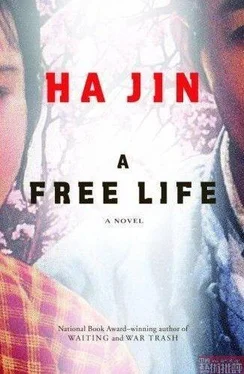Beef."
"I don't know how to cook that."
"D'you want me to come in and help you?" He slitted his eyes, leering at her.
"Okay, okay, I will see what I can do." She retreated into the kitchen.
As she was about to make for the back door, a piercing siren shrilled, rising louder and louder. The man was frightened. He spun around and rushed away to the front door. Before he could get out, three policemen came in and pointed their pistols at him. "Hold it there!" one of them ordered.
With a groan the man slumped to the floor. He wailed hoarsely, "I'm sorry! I'm really down and out. I need money to buy a birthday gift for my kid."
The police fell on him, pressed him on the floor, and handcuffed him. Then they pulled him up. Niyan came in and spat at the man's face, saying, "Shame on you! The bank is right across the street. Why don't you go there? We're poor too." She raised her hand and pulled off his marled hat, woven of black and orange wool and still bearing a Wal-Mart tag marked with the price-$3.75.
"Hey, hey, don't touch him!" said the short policeman with a beer belly, flipping the cylinder of the small revolver to remove the bullets. His colleagues were inspecting the crime scene, one in the kitchen.
"Can't make it anymore," the man mumbled to Niyan.
"Stop lying!" she snapped. "You still have money for a new hat."
"It's a gift from my girlfriend," he grunted.
Niyan turned to Pingping. "Good heavens, hear this? He keeps a woman while he's totally broke." She thrust the hat into his left pocket.
Pingping said to him, "You should feel shame yourself."
"I'm sorry, ma'am," the man muttered, and hung his head, showing a whitish spot on his crown.
Pingping inserted his half bottle of whiskey under his arm. "Take your stuff." She then pulled all the cash out of his right pocket while explaining to the officers, "He grab all money from our machine."
"All right, let's go." The short policeman slapped the criminal on the back, then steered him toward the door.
An older officer began asking Pingping and Niyan questions. The waitress boasted that she could have grabbed the gun left by the man on the counter and shot him, but she phoned the police instead. "He's stupid, you know," she said, one palm on her hip.
"Never take the law into your own hands. You did the right thing," said the stalwart officer in a nasal voice, writing on a clipboard.
Pingping thanked him again and again for coming to their rescue.
When Nan came back, his wife, still beside herself, shouted at him, "I thought you had forgotten this place. Why are you here?"
He was taken aback by her tear-stained face and didn't respond. She was trembling a little as she spoke. After hearing about what had happened, he apologized and promised he wouldn't go to any of those meetings again.
Pingping went on, "If Niyan hadn't called the police, that robber would have rushed into the kitchen and killed me in there. I was so scared! My legs still can't stop shaking."
Niyan tittered. Nan threw an arm around his wife and told her, "We're poor too. I never thought someone would rob us. Don't cry, Pingping. I won't leave this place to you alone again. That man must have been really destitute."
"Maybe so. He wasn't like a professional robber. Probably he was scared too. I'm sure he was drunk."
Niyan put in, "Maybe we should keep a gun here."
"No, no, absolutely not!" Nan said. "If a robber shows up again, just give him what he wants. The most important thing is not to get yourself hurt. Understood?"
" Yes, sir," replied the waitress with a grin.
THOUGH Taotao read The Oxford American Dictionary from time to time, he refused to learn Chinese anymore. Whenever his parents urged him to write some characters, he'd claim his hand hurt so much that he was suffering from carpal tunnel syndrome. What was that? His parents had no clue. They believed the problem lay in his mind and it was his laziness that had caused the constant slippage with his Chinese writing. He could speak and understand Mandarin but could no longer read or write the words. Even when he spoke the language, he used it only in a rudimentary way. He was tired of his parents' litany of the advantages in being fully bilingual. One afternoon his father yelled at him in the storage room, demanding that the boy promise to work hard on the written characters, but Taotao wouldn't give him his word and instead complained about the use-lessness of Chinese in his life. Shubo happened to be present and tried to convince the boy of the necessity of keeping his mother tongue.
"It's too hard," Taotao said. "I've already spent so many years on it and can't even keep the words I had learned before I was six." Recently he had begun to resent the more difficult characters. Among those he could recognize, he hated the killer ideogram cang (hide) most, never able to remember the order and number of its strokes.
"You've never poot your heart into it. Of coss you have regressed so much," Nan said.
Shubo coaxed, "Taotao, don't give up. Stroke by stroke you can fell an oak."
"I don't want to cut down any tree!"
"I mean, no pains, no gains-if you keep to try, you will master Chinese."
"Fat chance," grunted the boy. "Yes, you still have a big chance." "I don't mean that."
His father broke in, "I know what you mean-'a very slim chance.' No matter what, you must continue to learn Chinese."
Unlike Nan, Pingping sympathized with their son and in private pointed out to Nan that Taotao would never learn enough of the language for taking the SAT II Chinese test. Her argument sank in, and for several days Nan left him alone.
Now it was time for the boy to decide what foreign language to study in middle and high schools. There were Sunday Chinese classes at Emory University, which many children attended, but on weekends Nan and Pingping had to work and couldn't drive their son into Atlanta. Moreover, Pingping didn't believe Taotao would benefit much from knowing Chinese. She felt English was much more expressive and more useful. Back in China she could hardly write anything, but here once she learned a little English, she had found herself able to write a lot, as if whatever she put on paper became interesting. Nan agreed with her. Compared with written Chinese, English was indeed a language of common people, despite being hard to master, its grammatical rules too loose and its idioms defying logic. Without question, their son should devote himself more to this alphabet.
So they stopped badgering him to inscribe the characters. If the boy didn't like Chinese, he would never master it by copying the words. Maybe someday they could send him to Pingping's parents during the summer; that way he could regain his fluency and literacy in his mother tongue. In his school Latin was very popular, and he applied for it but couldn't get into the class. It was said that some students had learned Latin so well that they kept diaries in the dead tongue so that their parents couldn't tell what they wrote. Nan knew that the knowledge of Latin would strengthen his son's English, so he was displeased that Taotao couldn't enroll in the class.
Later Pingping found out that besides English, most papers in science were published in three other languages: French, German, and Japanese. So it would be better if Taotao took up either German or French, both offered at his school. At the beginning of the next semester he chose to learn French, which turned out to be so easy for him that he soon excelled in the class.
Once he asked his parents, "Can I major in French in college?"
"You should study to be doctor," Pingping said. "What profession is better than save people's life?"
"I don't like medical science. How about art history or English? Can I major in art history?"
Читать дальше












